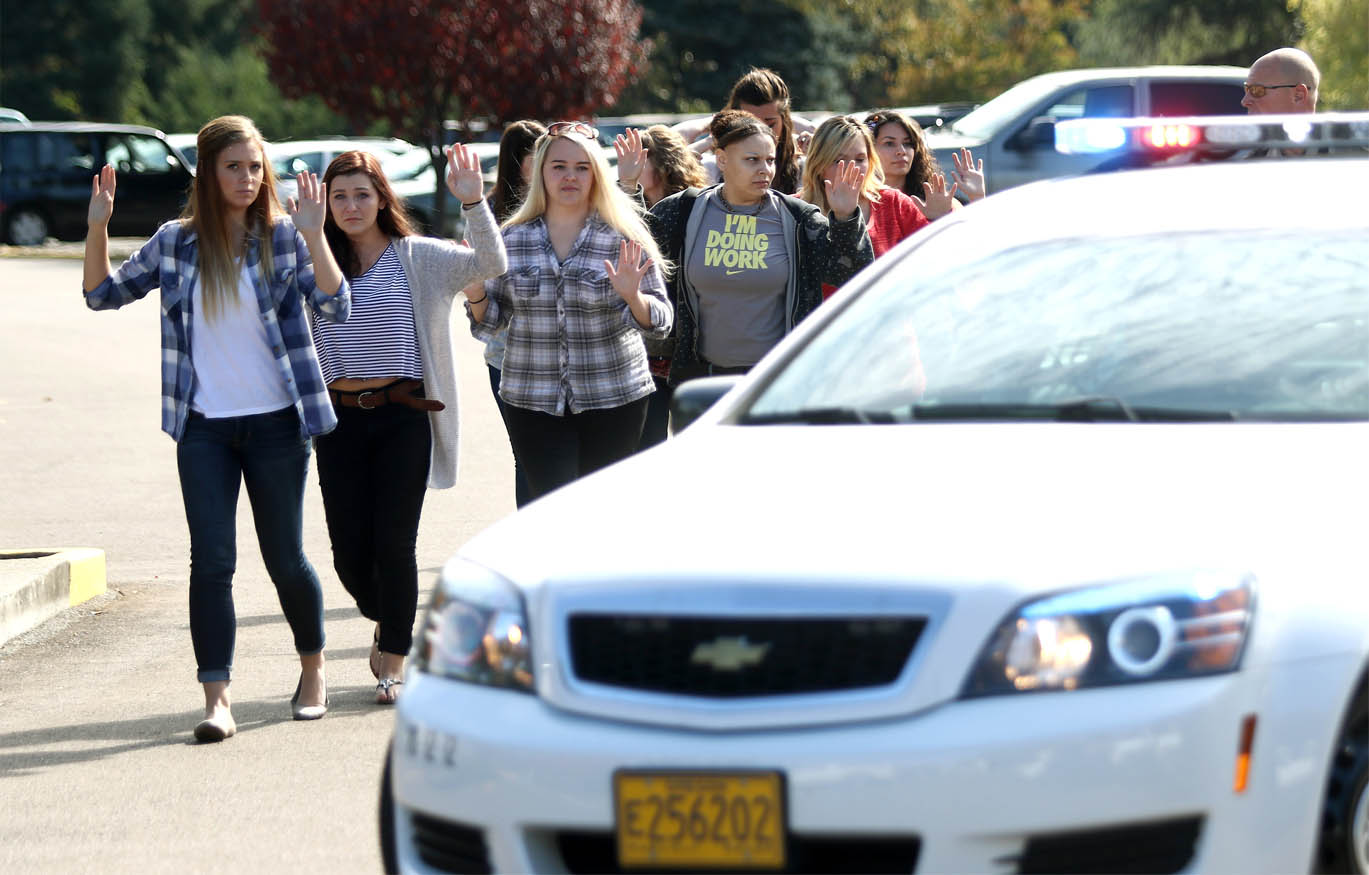My mom and two younger sisters and I have a group text. We use it to share exciting news, make announcements and show one another the most recent chicken memes we’ve found.
On October 5, I messaged our group text telling my sisters that they might want to skip their classes at UT Austin and St. Edward’s University the following day.
A post had been discovered on 4chan, a notoriously sketchy website, warning students in Austin to stay home from school on Tuesday. The anonymous post was almost identical to the one that was posted the previous week, the day before Christopher Harper-Mercer opened fire at Umpqua Community College in Oregon, killing nine people and wounding nine more.
No gun-related violence ended up taking place on any of the Austin campuses on Tuesday. It’s possible that the threat was a hoax to begin with, fabricated, as my sister put it, by “some idiot with a nasty test.” More worrisomely, perhaps the threat was real, and the potential shooter backed down when he realized that the police had been alerted to the post by other Internet users.
In the fall of 2010, only a couple of months into my freshman year of college at the University of Texas at Austin, a gunman with an AK-47 opened fire near the PCL, UT’s main library. Students and pedestrians scattered.
The gunman made his way to the sixth floor of the PCL, where he committed suicide. Thankfully, no one else was injured. A mere block away, I and the rest of my 8:00 a.m. Calculus class cowered on the floor of the teachers’ lounge in the Classics building. It remains one of the most surreal experiences of my life.
What I remember most, more vividly than even the fear that permeated the room until police officers arrived to give us the all-clear, was the sensation of abject helplessness that I felt when I realized that control of my life was completely out of my hands.
I think that on a much larger scale, the entire nation is beginning to understand this feeling: it’s starting to feel like school shootings are snowballing, gathering momentum, becoming unstoppable.
The names of certain schools now have a permanently morbid connotation, each syllable falling like a bell tolling: Sandy Hook. Virginia Tech. Columbine. And now: Umpqua Community College. And the truly tragic thing is, those are only the big shootings, the ones large enough to make national news.
Countless other shootings in which only one or two people are injured — like the one at Texas Southern University on October 9 — take place on a nearly weekly basis across the country. It’s enough to put anyone on edge, knowing that if the quiet guy who sits by himself in Anthropology were to suddenly whip out a pistol, you’d be powerless to stop him.
Each shooting is followed by a more or less predictable chain of events: the President sends his condolences and expresses support for the affected community. Liberals insist on stricter gun control laws, limited access to guns for dangerous individuals and the elimination of campus carry privileges.
Conservatives retaliate, saying that gun ownership and campus carry enable citizens to defend themselves against shooters. At some point, it’s discovered that the shooter in question had a history of mental illness, and then a third group clamors for the complete overhaul of our mental health care system. Ad nauseam. The fact that something needs to be done is more or less a foregone conclusion. Figuring out exactly what that “something” is, however, is a much more complicated matter.
I started shooting guns when I was 10 years old. By 12, I shot regularly at skeet and rifle ranges with my dad. Between the ages of 12 and 22, I took two hunters’ safety courses and one handgun proficiency course. As a child, I watched in silent excitement, my fingers stuffed in my ears, as my father leaned out a window of our two-story house once a year and shot a white-tail deer on the other side of the fence. He would string the deer up by the hind legs on the same tree that my sisters and I used for climbing, and gut it into the garbage bag spread below.
When he put my first gun in my hands (a plastic Grizzly BB gun), he told me sternly that I should never point my gun at anything I wasn’t prepared to shoot, that I should never put my finger on the trigger until I was prepared to fire, and that I should never fire unless I fully planned on killing something. I shot a hole in the living room window and had my gun privileges revoked for weeks.
The first real gun I ever held was a small, 20-gauge Remington shotgun. I remember, very clearly, the electrifying thrill of mingled fear and power as I realized that right then, if I wanted to, I could kill someone. It was such a morbid, terrifying thought that it nearly nauseated me. I clutched the gun tighter in now-sweaty hands and pointed it very determinedly at the sky. The feeling has never gone away. Though still terrifying, in time, I have learned to acknowledge it for what it is: a sign of healthy respect for the immense amount of power that guns confer.
Once an unquestioned, seemingly integral part of the American Constitution, the 2nd Amendment — the right to bear arms — has come under fire in the last several years as the death toll from school shootings climbs higher. The problem is that even the people who agree that the 2nd Amendment needs revision have a hard time reaching a consensus on exactly how that should be done.
Some are of the extreme opinion that the 2nd Amendment as a whole is obsolete and should be stricken from the Constitution. Others maintain that the 2nd Amendment, though still relevant, bears updating.
As one anonymous Tumblr user put it, “The 2nd Amendment was intended to help keep bears and the British off of early colonists’ land. Neither of those are relevant threats anymore.” People are quick to point out that most European countries, which enforce stricter gun control laws, have lower rates of school shootings than America.
It’s probably safe to assume that the US government will never succeed in eradicating gun ownership completely. In Texas especially, even the suggestion of asking residents to surrender their firearms would probably prompt the Lone Star State to make good on its threats of secession.
Other less extreme options involve restricting the eligibility of gun ownership or instituting a registration system for gun owners. In some European countries, prospective gun owners are required to obtain a permit before purchasing a firearm — some go so far as to require specific permits for different types of firearms (handgun permits vs. hunting permits).
Eligibility for ownership is restricted on the basis of the applicant’s ability to pass a variety of tests, including background checks, psychiatric evaluations, safe storage requirements and, in some cases, proof of a valid reason for gun ownership. If and when an individual does buy a firearm, they might be required to register it under his/her name in a national database, or take a governmentally approved safety course.
Though some US states have enacted background checks and eligibility restrictions that bar those with mental illness or extensive criminal records from purchasing guns, the restrictions are less comprehensive and inadequately enforced compared to their European counterparts. Moreover, even being prevented from purchasing a gun from a licensed dealer doesn’t stop individuals from buying privately in under-the-table sales or black markets.
A gun, in the American psyche, is more than a utility item. They exist as tools, as weapons, as toys, yes, but more than that, they exist as a symbol of all the things America loves about itself. The early colonists won their independence from Britain with the same muskets they used for hunting and supporting themselves in the frontier. The right to keep and carry guns is psychologically and symbolically linked with resistance to oppression and self-reliance, making gun rights an ideological rather than practical issue.
As a result, the never-ending tug-of-war between knowing that something needs to be done and feeling unable to do anything — the debate in a nutshell — has left ex-Marine Cory Ramos, like so many others our age, exasperated and cynical.
“We are a violent, gun-worshipping culture as a nation, and that’s not bad, so long as proper safety guidelines are met,” said Ramos. “But let’s be real, as a culture we are rash, impulsive and rarely level-headed, and on an individual level we are numb to the impact of how destructive our actions can become.”
“I’m in favor of at least attempting to strive for a gun free state, but [giving up] ‘certain elements of your personal freedom’ can have huge implications. So it really depends on what individuals will have to give up and what they will be receiving in return.”
The issue boils down to an ideological trade-off: how much personal liberty (in the form of access to guns) are you willing to exchange for a higher degree of assurance that the guy sitting across from you in the student center isn’t hiding a gun in his duffel bag.
Given our obsessive love affair with individual rights of all stripes and sizes, even the thought of an America with anything less than completely unrestricted access to our guns seems borderline blasphemous.
Kenny Bolster, a graduate student at USC, shared a perspective I’d never heard. He mentioned increasing the stringency of background checks and limiting the lethality of legal weapons, as well as restricting where guns can be used.
“Firearm bans in high population urban areas,” said Bolster. “No guns on college campuses. [On college campuses] you’ve got an environment with an enormously dense population of individuals with high stress rates, high rates of mental illness onset…high rates of drug and alcohol abuse and high rates of suicide. Adding guns to the mix is a terrible, terrible, idea.”
He lives in the city, and knows that his proposal would mean his own access to firearms would be restricted.
“I am willing to sacrifice elements of my personal freedom for [a greater degree of restriction on guns],” he said calmly.
Personally, I know I’d happily suffer through stiffer background checks, more rigorous psychiatric evaluations and state-mandated educational courses if it meant that I never had to text my sisters to not go to school the next day.
It’s easy to let your eyes glaze over when conversations turns political, to trust that “Washington” (a plural collective noun) will figure it out — but the end to this issue can start on college campuses.
The next presidential election is a year away, and we need to take a hard stand on one of the only issues that affects students more than anyone else — we’re the ones on campus, not the rest of the country — whose opinion could possibly be more relevant when talking about campus shootings than ours? It’s time for everyone to ask themselves what exactly they’re willing to sacrifice for safety.












